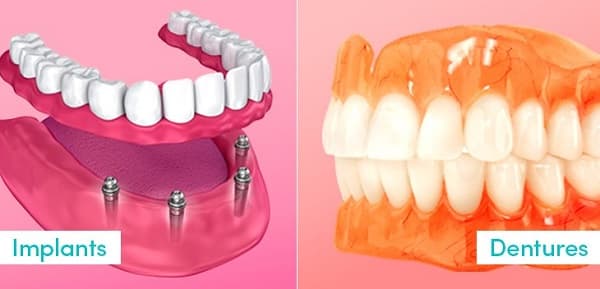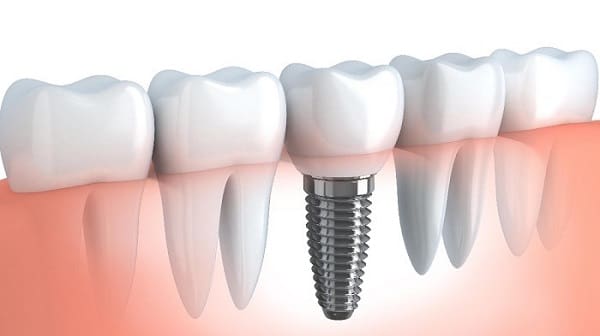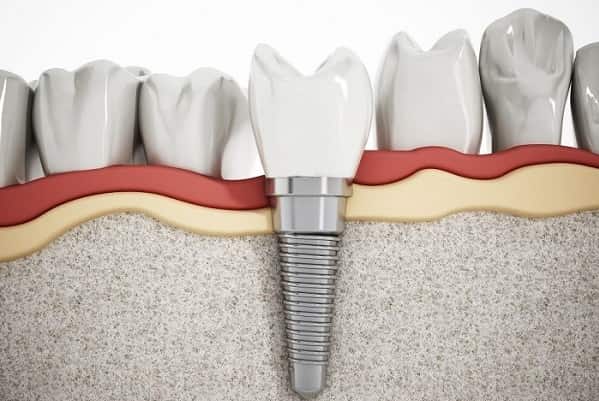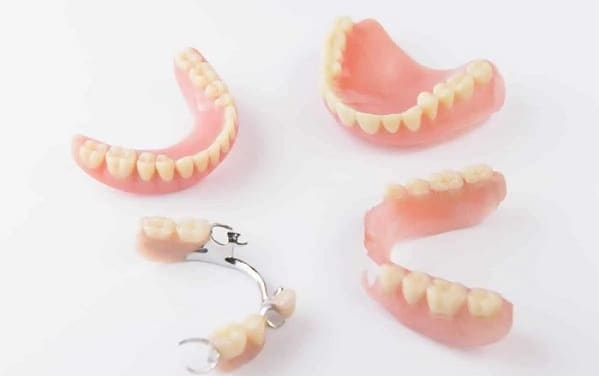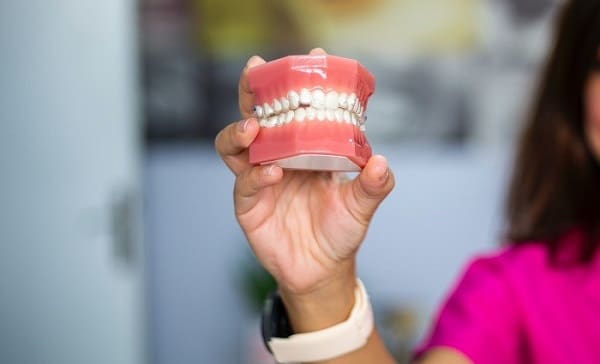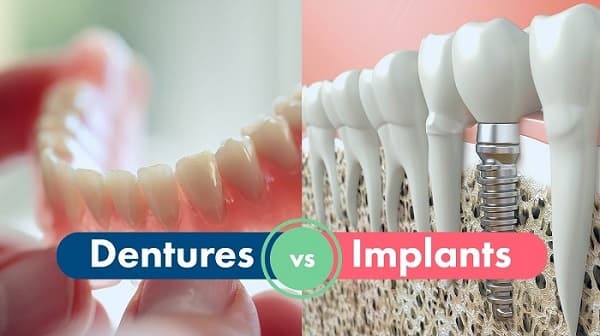If you’ve lost one or more teeth, plugging the gap can lower your risk of oral health problems and support the healthy teeth on either side so they don’t shift and become crooked.
Your dentist will discuss all the different options for replacing your missing teeth, so you can choose the treatment that’s right for you. Two of the most popular options are dentures and dental implants, which each have their advantages and disadvantages for different people.
Dental implants
A dental implant is a tiny screw made of biocompatible titanium that is placed in the jawbone. After healing for three to six months, the implant will be fused with the jawbone, replacing the tooth roots. It will then be topped with a permanent restoration. During the healing process, you will wear a partial denture or other temporary restoration, unless you receive an immediate load implant.
Benefits
Dental Implants Are A Better Long-Term Investment
Though dental implants are expensive compared to partial dentures, they are often a better long-term investment. This is because a typical dental implant will last 20-30 years, and potentially even longer with proper dental hygiene. As a comparison, dentures must often be replaced every 3-8 years. This means that in the long run, dental implants will save you both time and money.
Dental Implants Look And Feel More Natural Than Partial Dentures
Dental implants are actually surgically implanted where your missing tooth used to be. This means that your implant will look and feel completely natural.
On the other hand, partial dentures are usually secured to the surrounding teeth. They tend to shift and move, and they won’t always look or feel completely natural.
Dental Implants Prevent Bone And Gum Tissue Loss
One of the other big advantages of dental implants is that the implant stimulates the underlying bone and jaw tissue, preventing it from receding. Because partial dentures only rest above the gum tissue, they do not have this effect, which can lead to the loss of gum tissue and weakening of the jawbone.
Dental Implants Don’t Require As Much Care
Partial dentures must regularly be cleaned, and have to be rinsed after each meal to prevent food from building up below the denture, which means you’ll spend a lot of time maintaining your denture.
Dental implants require no special care. All you have to do is brush your teeth twice a day, floss normally, and see dentists for a regular six-month teeth cleaning and oral exam. That’s it!
Dental Implants Don’t Slip Or Move
Even the best partial dentures will slip or move somewhat while chewing, eating, and speaking. It takes a while to adjust to this slippage, which can make it more difficult to speak and chew with confidence.
Dental implants do not move or slip at all. Their design ensures that they stay solidly implanted in your gum line, and that they are just as secure as a natural tooth would be.
Disadvantages of Dental Implants
Dental implants also have some disadvantages, including:
- Dental implant placement is considered a minor oral surgery, and all surgeries carry a very low risk of complications such as nerve damage or infection. These risks are slightly higher, though still quite low, for those with underlying medical conditions such as diabetes or heart disease.
- Unless you receive an immediate load implant, you will need to use a temporary solution for three to six months, allowing the bone to heal.
- When it comes to costs of dental implants vs dentures, dentures are the cheaper choice.
- Not everyone is a candidate for dental implants, since implants need healthy bones and gums to secure properly to the jaw. (Bone and tissue grafts can be done, however, that will further rack up the price).
Dentures
Dentures are removable appliances for your mouth. They replace both missing teeth as well as some of the gum tissue.
Dentures are made of a pink gum colored acrylic base. This base supports the denture teeth. Some dentures will include a lightweight metal framework that provides extra strength and support. With dentures, you have two options: removable complete dentures and partial dentures.
- Complete Dentures: First, complete or full dentures replace all the teeth in the upper or lower jaw or in both jaws. Complete dentures rest directly on the gums.
- Partial Dentures: Partial dentures, on the other hand, are used to fill in gaps. Because of this, partial dentures are more often used when some of the natural teeth still remain. These dentures are supported by clasps around existing teeth. Partial dentures may also be attached with precision attachments that are fitted onto crowns.
Benefits of choosing dentures
Can Closely Match Gum Color
Replacement teeth will look quite natural as modern denture teeth come in many different shapes, sizes and shades. The pink acrylic used to replicate your gum tissue can be closely matched to your natural gum color.
Affordable
Dentures are the more affordable option, particularly if you need to replace multiple teeth.
Non-Invasive
The process for making dentures is non-invasive and unlike implants doesn’t require any surgery.
Easy to Adjust
Dentures are easy to adjust and modifications can be made to accommodate further tooth loss.
Support Face Structure
Correctly made dentures will support the cheeks and lips, restoring height between the upper and lower jaws so the face no longer looks as if it has collapsed inwards.
Drawbacks of selecting dentures
Not as Natural Looking
They don’t look quite as natural as implants since they display acrylic instead of actual gum tissue.
Higher Maintenance
They need to be removed and cleaned regularly, and must be left out of the mouth overnight to give the gums a chance to recover.
Can Shift Around
Dentures can sometimes slip around, particularly if they have been worn for a few years as the jawbone changes shape, becoming flatter and less able to provide retention. Messy and expensive denture adhesives only provide a temporary solution.
Harder to Talk With
Some people find it difficult to get used to speaking and eating with dentures and may lack the muscle control required to hold them in place.
Can’t Eat Certain Foods
There are restrictions on the types of foods that can be eaten. These restrictions may make it more difficult to have a balanced diet that provides all the nutrients required for good overall health.
They Trap Food
Dentures tend to trap food which can increase the risk of gum disease and decay of remaining teeth.
Fragile
Dentures can be quite fragile and are likely to break if dropped.
Not Permanent
They usually need to be replaced every three to six years (versus 15-20+ years for implants), although those with a metal framework and which are supported by natural teeth may last a little longer.
Removable
Some people have a psychological aversion to wearing dentures and would prefer not to have removable teeth.
Can Weaken Surrounding Teeth
Partial dentures can weaken the natural teeth supporting them, and it may be necessary for these teeth to be re-shaped or adapted slightly to accommodate the dentures clasps.
Cost Comparison
Dentures
The cost of dentures can vary according to where you live and the quality of dentures chosen. While it is possible to purchase cheap dentures, you’ll often find you get what you pay for. High quality restorations use materials and techniques that replicate the appearance of natural gum tissue and teeth. These materials tend to be stronger and longer-lasting and may even include a warranty.
Dental Implants
They tend to be more expensive than dentures, but the costs depend on your dentist’s experience and popularity, your location, your dental health, the type of implant used, what diagnostic tests are required (x-rays, CT scan, etc.) and whether or not additional procedures such as a bone graft or sinus lift are required.
Other factors to take into consideration include the number of teeth being replaced and the number of implants required as multiple missing teeth can be replaced with a bridge or denture supported by only 2-4 implants.
What to Consider When Choosing Dental Implants vs Dentures?
Dental implants are largely regarded as the gold standard for replacing missing teeth due to the way they replicate natural tooth roots which helps preserve the jawbone and gum tissue in addition to providing the best aesthetics. In the same vein, dentures can be tricky to wear, restrict your food choices and need to be replaced more frequently.
However, there are many situations where dentures are the best option. Implants aren’t suitable for everybody. Dentures could be the answer if you are opposed to having oral surgery, grind or clench your teeth, can’t quit smoking or have a medical condition that significantly increases the risk of implant failure such as diabetes or any disease that compromises your immune system. They are also a great short-term option (several years) if you are currently unable to afford implants.
Of course, you can weigh the pros and cons of dental implants vs dentures. However, the right choice will vary depending on the individual.
Here are some other factors to consider when deciding between dental implants vs dentures:
- Durability: Dental implants that are properly cared for can last years, and sometimes even for life! This means costs can be lower in the long term, since dentures, in comparison, will need replacements relatively frequently.
- Long-term oral health: By stimulating them with the forces produced by chewing, implants will help to preserve bone and prevent gum tissue from shrinking. This also reduces your risk of losing more teeth. Dentures, on the other hand, do not have this effect. In fact, an ill-fitting restoration can even accelerate bone loss in some cases.
- Oral hygiene: Dentures will need to be cleaned meticulously every day Implants, however, can be maintained simply by brushing and flossing, as you would do with regular teeth.
- Improved appearance: Implants look and function very naturally and in a way that is similar to your own teeth. In comparison, dentures can feel bulky.
Combination of Both: All-on-4
The All-on-4 technique is used to replace an upper or lower regular denture with a fixed denture that is supported using four implants.
This technique is based on the way the implants are angled, as the two at the front of the mouth are placed at a 90° angle, while the two on either side are placed tilted backwards at a 45° angle in order to maximize the use of available bone to hold the denture securely in position. This is a specialized technique that requires additional training and planning.

